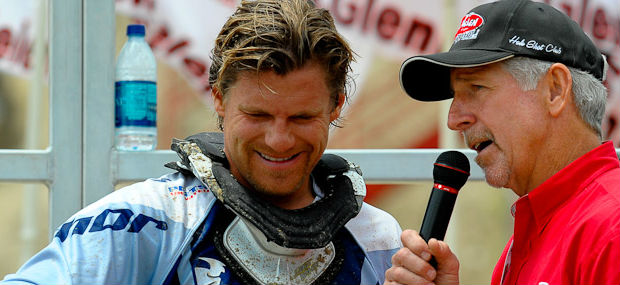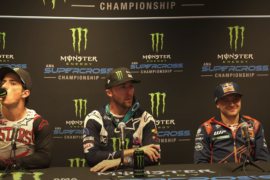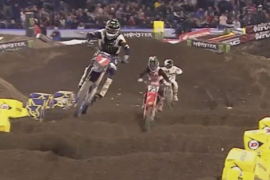Photo: Brian Robinette
In part one of this interview with Greg Albertyn, Greg told us about his early years of racing and his three World Championships in the FIM Motocross World Championships. In part two, we follow Greg over to America where he struggled to get acclimated and stay injury-free through his introduction to American Motocross and Supercross before finally accomplishing a lifelong dream. Greg did the only thing he knew how to do: win.
If you missed part one you can read that here>>>
So you win the World title in ’94. When Sylvan signed you to the Suzuki deal, was part of the deal that you would head to the States in ’95?
That was not necessarily part of the deal. He knew where I wanted to go, obviously, and we would then try to start negotiating, but at that time, Suzuki’s program in the States was a total disaster. I mean, they really didn’t have any sort of anything solid. So part of my stipulation was that Roger DeCoster had to become team manager. In July of ’94, Roger came to my apartment in Belgium. He was doing some freelance stuff for some European teams. I said, “Listen, I want to go to Suzuki, but their program’s junk. Part of the thing is you need to be there, and we need to have Ian as well.” At that point, Roger’s deal got accepted, my deal got accepted, and Ian came along. We made it happen.
And the rest is history. I had no idea that you had a big part in Roger coming to Suzuki. What was your main reason—I know Roger has done it all—but what was your draw to him as a team manager? Was it his R&D work, just his guidance?
Well, I’d known his reputation from Honda and what he had done there. A man of his stature and caliber—he sure knew what he was doing. Again, we sort of collaborated, and at that point, I was like, “I need you guys. I need you there because from what I hear and what I see, they really don’t have a professional operation.”
That was probably true—and why they hadn’t won a 250cc national title since Kent Howerton in 1981.
Exactly.
I know it’s a little off track, but I always wanted to ask you about hitting the deer at Des Nations. Wasn’t that at the 1994 Motocross des Nation?
Yeah, so I have three incredible years. Before I’m 21, I win three World Championships back to back, and then, it was like the pendulum swung the other way right after I won the World Championship. Leading Des Nations in ’94, I hit the deer. About a week later, riding in South Africa, I break my navicular, and literally from hitting that deer for almost about a year and a half solid, I was injured. It was just unbelievable. The pendulum just swung exactly the other way.
At any point in ’94 were you like, “Man, maybe I could just stay in Europe and been the man,” or was it always, “I’m going to America and going to test myself against the best?”
No, it was always that I was going. Again, it comes back to never being content with repeating the same victory over and over. For me, that just wasn’t an option. In hindsight, looking back at my career, would it have been a smarter option? Possibly. (Laughs) I know for a fact that at that point I had Everts totally, totally demoralized and dominated. To trade teams with him and then still beat him—I mean, he was just ruined, ruined. So in hindsight, who knows what it would have done or anything, but do I have any regrets? Absolutely not. My goal was always to come over and be a national supercross champion. Unfortunately, the only thing that’s ever eluded me in my whole life is the supercross championship.
I’m surprised to hear that the supercross championship was your ultimate goal. Was it just the prestige of it all?
Well, all of it. You know, the prestige and everything that surrounds it. Unfortunately for me, it just never came naturally; it just was never easy, whereas outdoors just suited me better.
So the navicular you broke in ’94, was that the same navicular you had broken a couple of years earlier?
No, it was actually the other one. So then, I actually got back on the bike about two weeks before the Orlando Supercross and had some weird little crash and dislocated my shoulder—but in the opposite direction: downwards. Then, I separated the other shoulder about six weeks later. Then, a hard ankle sprain here and there. (Laughs) At Troy, Ohio I didn’t even crash and broke my other navicular. That one was broken and didn’t heal, so I had to have a bone graph. I was in a cast for six months. Now, it’s El Niño, and Suzuki didn’t have a supercross track at that point, so I’m riding in the hills trying to practice for supercross, the muddy sloppy hills. And I dislocate the same shoulder exactly a year to the day later in the same unique way, upwards instead of downwards. Then I pulled all the ligaments in my ankle about three weeks later in the San Diego Supercross. It was just a never ending string of injuries. It was incredible.
Yeah, I agree. It was hard to watch at times. Some thought that maybe your drive to succeed hurt you because you would return too fast from some of the injuries. Do you think there may have been some truth to that?
I think definitely. My personality is “lay it all on the line.” If you’re in fifth place and you want to get to first, just do it. But yeah, it was unwise and over eagerness in a lot of ways. I always made sure I was healthy before I came back, but I would simply ride over my head, simple as that.
Well, other than the injuries when you first got into AMA Supercross, you definitely showed you had the speed to compete at the front in motocross. In your first AMA Motocross at Gatorback, you went right to the front, won a moto and, if not for a mechanical, would have probably had the overall.
Yeah, I would have won the O/A, but my wheel collapsed. Exactly.
That was probably one of 10,000 wheels that have collapsed at that track. That place was brutal on wheels back then, but right off the bat, you showed you would be a contender outdoors. How were you received by the riders when you first got here?
Well, everyone was looking at me in my day-glo Bieffe gear, and they were laughing, and then they got pissed when they saw me in front of them. (Laughs) I think nobody really thought I was a serious threat. Unfortunately, nobody in the States ever saw me at my best. I only really had one good year out of five or six. So yeah, nobody here saw me at my best.
You don’t give yourself enough credit. (Laughs) 1998 was a good year too, if only you could have gotten in front of Henry off the line.
Yeah, in ‘98 I won the 250cc Championship, and Doug Henry won Championship for the 400’s. (Laughs)
(Laughs) He must have holeshotted twelve, maybe fifteen motos on that beast in ‘98.
96% of the motos. You’re right. (Laughs) Nah, but he deserved it. He rode very well, but that was definitely a good bike.
Let’s go back a little bit to 1996 and your first-ever AMA National win at Unadilla. How was that? Was that a top of the mountain feeling or a just a big step on the way to the top?
No, that was just one of those little spurts of hope where you’re like, “I think I can still do it. Maybe I can still do it.” I mean, after a year and a half of injuries—people don’t realize that as a professional athlete, when you’re injured it is way more mentally demoralizing than physically. You can come back from any physical injury, but mentally it’s tough. Your competition is charging forward confidence-wise, ability-wise and everything, and you’ve gone backwards. And your mind plays games on you. For me to come back and pull myself out of that downward spiral was probably the greatest challenge I’ve ever faced.
And that came on what was arguably the worst bike on the track: the 1996 RM 250. I’m not sure I can say arguably; there is probably at least one guy somewhere that loved it. (Laughs)
The ‘96 bike was probably the worst bike I ever rode. I’m not kidding you. Ian and those guys laugh about that bike. That thing was pushing out 41 to 43 horsepower. Now, the 250Fs are pushing out way more than that. We were racing against [Jeff] Emig and them on their Kawis, and they were pushing out 50 plus horsepower. It was so far off, it was ridiculous.
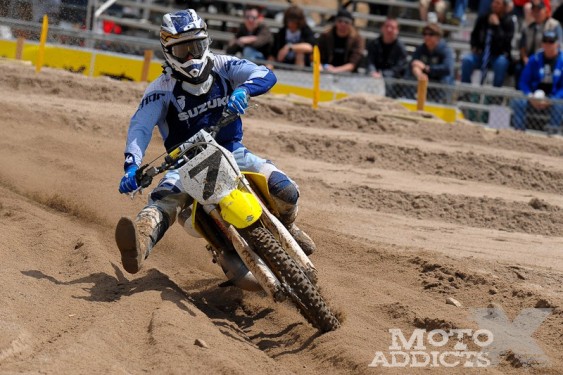
So in the end—in comparison to most of your early years in the U.S. at least—you were relatively injury-free for 1996, right?
Well, in supercross I was injured and then relatively well, I think, compared to other years, but I came into the outdoor season hurt. I definitely had some issues. The only season in my whole U.S. career that I was actually healthy going into the Nationals was 1999.
In 1997, you ended up with Jeremy McGrath on your team when he went to Suzuki. I know MC was a fierce competitor, but what was it like to be on the same team?
It was great, excellent! He definitely elevated my supercross riding skills. I think that was the best supercross season I ever had. I won once, had five podiums and ended up finishing fifth in the series.
That was fifth in a very stacked class, as well.
Yeah, there was a lot of talent. I think even [Damon] Bradshaw was back then. Then you had [Mike] Kiedrowski, [Mike] Larocco, Jimmy Button, Michel Pichon; it was stacked alright. That’s for sure. It was good, though. He brought so much press and notoriety to the team. I definitely benefited from it, no negatives.
Yeah, you mentioned that you won a supercross in 1998. What was it like to win the Los Angeles Supercross after all you had gone through to get there?
Incredible, especially with coming through the period I just had. It was just mind blowing. (Laughs) I think if people had to put odds on that race, I probably would have been a hundred to one against winning it. But no, it was absolutely mind blowing. To have that monkey off my back, as they say, was just huge, huge, huge.
Yeah, it was fun to watch, and looking back, if any supercross—other than Daytona—suited you, it was Los Angeles that year.
Yeah, I look back at videos now, and I think, “My gosh, how slow are we going?” It’s just crazy, but it was absolutely epic. No question about it.
Let’s move on to your year: 1999. We talked earlier about how bad 1996 was, but in contrast, the 1999 RM 250 was their best bike, to me at least. I really liked the ‘99.
I wouldn’t go that far, but I think it was a steady progress. From Roger and Ian getting there in ‘95, it was a big step backwards in ‘96 and, then, slowly built forward and forward. I would say the ‘99 bike was just good enough to win the Championship. When you look back at how many times [Kevin] Windham holeshotted, he should have won that Championship without question. I would say the best bike Suzuki ever made was 2002–03. That bike was just incredible.
So you win the 1999 250cc AMA National Championship with pure consistency. You only won three overalls, correct?
Yeah, I think it was three overalls, but I missed the overall like three or four times by one point. I’d go 3-1 and somebody else would go 2-1, or something like that. I missed it so many times, but yeah, it was definitely consistency that paid off.
How were you able to overcome the four stroke advantage that year?
I think, thankfully, that Henry was sort of in retirement mode at that point. He wasn’t as hot and focused as he was previously. If you remember, his results were definitely not as solid as they were the year before. Windham, Lusk and Tortelli, I mean, we battled in I don’t know how many races. It was tough.
After only winning two overalls throughout the year, you went out at and smoked everyone for the overall at the final round at Steel City. Was it a big deal to win the last one and show you were the Champ?
No, not at all. No, I’ve never been like that where you have to win the race to show your dominance. You win the Championship, and that’s what goes down in the history books. I’ve always done the best that I can on any given day and moto. When things click, they click, and that was one of those days that things clicked.
It’s all about the Championship, baby! (Laughs)
That’s what matters. (Laughs)
So you got it done. How did the 1999 AMA 250cc National Championship compare to all your World Championships and other accomplishments?
It was! Oh, man! It was a much, much deeper satisfaction. 1992 was probably the highest of the high. To be a total unknown entity and to go over and actually win the World Championship… unbelievable, the first person out of South Africa in I don’t know how many that had tried. That was probably the highest of the high that I could ever experience. To know that I could go back to Johannesburg airport and see all my friends and bring the title back was the most exhilarating, euphoric feeling you can imagine. 1999 was much more of a deep satisfaction like, “Man, I knew I could do it. I knew I could.” Everybody had written me off at that point. They thought, “He’s never going to do it.” So to do it with all the work at reversing that downward spiral, it was tough. Don’t get me wrong; to win a championship anywhere is difficult, but Americans mostly win championships in America. It’s their home country and what they’ve grown up with. You try to go from one continent to another and win a championship. Then go to another continent and win a national championship on a continent that is not your home. You have no family supporting you, no country support; you’re always an outsider. To try and overcome that is much harder than most people can imagine.
I cannot even imagine. You have won it all and won it all over the world. Was winning the AMA Championship the top of the mountain and time to start looking towards retirement, or were you ready for more championships when the femur break started pushing you that way?
No, I was 110% ready to defend my title. I absolutely wanted to do that. I came into the 1999 U.S. open and almost won that, but Emig won it. I went over to Japan, and I won the Tokyo Supercross. Things started coming together. I was like, “Alright, 2000 is my year for supercross.” I was going to do my absolute best to win the Championship in supercross and then defend the title outdoors. Then, I broke my femur, but I was still ready to defend my outdoor title. I was back on the bike after seven weeks. Then at Glen Helen, in eleven weeks, I finished fourth. Then at Hangtown, I tore my ACL without crashing, hyper extended my knee. Then I get to Mount Morris and it’s a mud bath. I get a bad start and crash about four times. With such slop, it was a total disaster out there. But then I pull off the track. My mechanic is like, “What’s wrong? What’s wrong? Why are you pulling off?” For the first time in my entire life, I couldn’t say what was wrong and why I’d pulled off. I just kind of looked at him and said, “I’m over it.” There was nothing wrong with my bike, I mean, other than grips full of mud and everything else, but I’d never pulled off the track ever unless there was either something physically wrong with me or with my bike. And that was the starting point. I just realized that I’d put in such a huge effort—I mean, everything I ever had—to come back from that downward spiral to actually win the Championship and now that I’d won it, you know, now still to break my femur, tear my ACL—it’s like, “I’m over it. I don’t think I can give it 100% anymore. I’m tired,” you know. I was still willing to give it 80%, but for me, why give anything 80%? If you’re going to do it, do it properly.
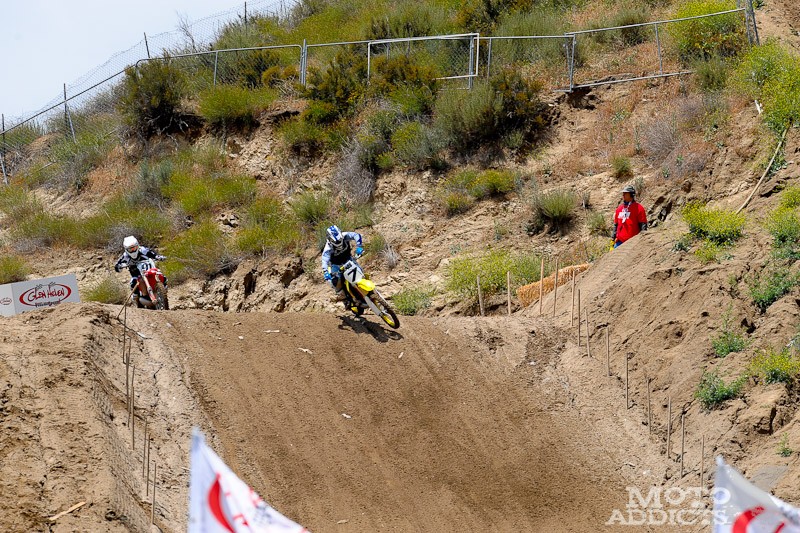
Yeah. I still can’t believe that you tore your ACL and decided to go race a mud race, but with your mentality, I can see how pulling off was a huge blow.
Yeah, I’d never done that in, you know, twenty something years of racing. I’d never done that. So for me it was like, wow. That just got the ball rolling, and it was a very difficult, but quick downward spiral from then. I just realized I was over it.
How pumped was Suzuki on winning a national championship after, wasn’t it, twenty years?
Yeah, it was 18 years since Barnett had won it. I mean, they were super, super pumped. And you know one of the things that I’m proud of is as soon as I’d made my decision, I let Suzuki know. You know, I’d just signed a two year deal with them for the 2000-01 season. I was making more money than I’d ever made in my whole career. I mean, all in it was probably about a million-five per year. And I just wanted to make sure they weren’t left without a solid rider. In a way, if you can’t give it 100%, you’re robbing your sponsors. And I’d never be willing to race for 80%. So I let them know early on, “I need you to release me out of my contract because I just think it’s not fair on you guys.” So they were then able to get Windham for 2001.
That’s incredible. Your million-five was guaranteed, I assume too. In hindsight, you could have just ridden around in 2001 and made your money.
Yeah, I mean some of it was maybe performance-based, but certainly a million-two of it was guaranteed.
Yeah, that’s integrity that you don’t see much anymore. Impressive.
I appreciate it.
You retired in 2001. How was that? Was the transition tough?
Also probably one of the toughest things in my life. You see it over and over and over again when athletes retire. They have such a hard time, you know, figuring out what they’re going to do. I mean, you lose your identity. Since you were a kid, that’s all you’ve ever done, and now all of the sudden, that’s not you anymore. You’re only as good as your last race, and now your last race was two weeks ago, a month ago, six weeks ago. People quickly forget you. So no, it was a very, very difficult transition, and thankfully, you know, God has been my rock and that’s where my foundation is as opposed to fame and fortune and stardom. That’s definitely helped me get through. There’s no question about it.
Yeah, it’s got to be rough. You did make a couple of appearances after that. I think it was ’03; didn’t you do a Glen Helen national, or did you do anything before that?
Yeah, you’re right. It was just total one-off stuff, but nothing in a large scale way like “I’m back!” Nothing like that. It was purely one-off stuff.
When did you have your first kid? Was that while you were still racing or after retirement?
No, it was long after retirement. I had my first kid in 2006.
In ’04—this had to be a huge you—you went back to South Africa and were awarded the Lifetime Achievement Award?
It was awesome, I mean, definitely very gratifying. It certainly felt really good.
Did you ever think of going back to South Africa, or was your plan always to remain in the States?
You know, I always thought before I got married that I’d definitely go back to South Africa. I have a very close family, and everybody’s back there. I thought, yeah for sure. But you know, you get involved, and my wife’s American. And then next minute you’re in business and you’ve got all these things going on. So no, I’ve never actually gone back.
Where are you living now, in California?
Yeah, I’m in Orange County.
Do you still ride much?
Yeah, I’ve actually just recently gotten back into it. Suzuki’s taking care of me, so I’m excited about that. I’ve got a bike, and I’ve been heading up lately. You know, I did my first riding school back in South Africa about three weeks ago and really enjoyed it, so I may look into really bringing up some future champions, you know, at the highest level—some guys that really want to get to the top.
Out of your home country, or do you plan on doing some here?
Well, both. You know, it’s definitely a good excuse for me to get back to South Africa, and I want to do that three or four times a year, but also over here for kids that are serious. There are some good trainers out there, there are some good physical trainers, but I want to give the complete package where you’re getting some character built into you, you’re getting some morals, you’re getting some riding techniques—the whole package type of thing.
Are you still part of the Smart Crutch company?
Yeah, I’m still doing the Smart Crutch thing. It’s been a rough few years with real estate, an industry that I was knee deep in. It just evaporated overnight. I’m not going to lie; it’s been a very difficult few years, challenging financially. But I’m looking to bounce back, and I have numerous things going on. We just launched Truth Soul Armor, a clothing line down in South Africa. I’ve got numerous things going on, and family keeps me busy.
If you missed part one you can read that here>>>
This interview was also featured in Motocross Illustrated’s Issue 15. You can check out the entire issue below.

